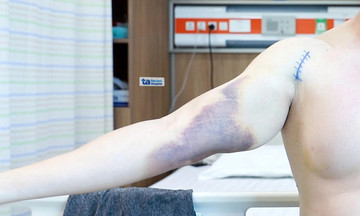Last week, Tinh experienced increased fatigue, dizziness, and blood pressure readings reaching 210/110 mmHg. While medication provided temporary relief, his blood pressure would rise again within a few hours. Doctor Do Anh Tuan, from the Department of Internal Cardiology at Tam Anh General Hospital's Heart Center in Ho Chi Minh City, reported that the patient arrived at the hospital with elevated blood pressure ranging from 170-190/100 mmHg, accompanied by dizziness and lightheadedness. Upon reviewing his medical history, doctors diagnosed him with an anxiety disorder, characterized by excessive worrying and frequent fear without a clear cause. In addition to psychological symptoms, individuals with this condition may experience insomnia, rapid heartbeat, sweating, headaches, and tremors.
According to Doctor Huynh Thanh Kieu, Head of the Department of Internal Cardiology 1 at the Heart Center, stress, anxiety, and anxiety disorders are common triggers for sudden spikes in blood pressure, posing significant health risks. Excessive worry increases cortisol and adrenaline levels, leading to a faster heart rate and vasoconstriction, which narrows blood vessels. Habits such as smoking, alcohol consumption, overeating, and certain anxiety medications can also contribute to high blood pressure.
 |
Doctor Tuan advises the patient on maintaining stable blood pressure after discharge. Photo: Ha Vu |
Doctor Tuan advises the patient on maintaining stable blood pressure after discharge. Photo: Ha Vu
Tinh underwent tests to rule out secondary causes of hypertension, such as kidney failure, renal artery stenosis, adrenal tumors, and hyperthyroidism. Doctors adjusted his blood pressure medication, provided reassurance and counseling, and prescribed medication for his anxiety disorder. Within a few days, Tinh's blood pressure stabilized to 120/80 mmHg, his fatigue and dizziness subsided, and his overall well-being improved, leading to his discharge from the hospital.
Sudden high blood pressure (hypertensive crisis), defined as a reading exceeding 180/120 mmHg, can damage the heart, brain, kidneys, and eyes. Contributing factors include anxiety disorders, high-sodium diets, pain relievers, non-compliance with medication (skipping doses or insufficient intake), inadequate sleep or frequent late nights, and underlying conditions like kidney disease, thyroid disorders, and diabetes. If left untreated, this can lead to stroke, heart failure, and retinal hemorrhage causing blindness.
If blood pressure readings exceed 160/100 mmHg without severe symptoms like headaches, dizziness, limb weakness, blurred vision, or nausea, individuals should rest and recheck their blood pressure after 30 minutes. If the reading remains high or stroke symptoms appear, such as dizziness, loss of balance, altered consciousness, facial drooping, slurred speech, or unilateral weakness, immediate medical attention is required.
To prevent hypertension, individuals should limit alcohol and tobacco use, choose low-sodium foods, avoid fried and fast food, and processed meals, while increasing their intake of fruits, vegetables, and unsaturated fats. Regular exercise, maintaining a healthy weight, balancing work and rest to manage stress, and screening and treatment for chronic conditions are also crucial. In Tinh’s case, doctors recommended consistent medication adherence, avoiding excessive worrying, ensuring adequate sleep, engaging in relaxing activities, and regularly monitoring blood pressure at home.
Thu Ha
* The patient's name has been changed.
| Readers can submit questions about cardiovascular diseases here for doctor's answers. |












